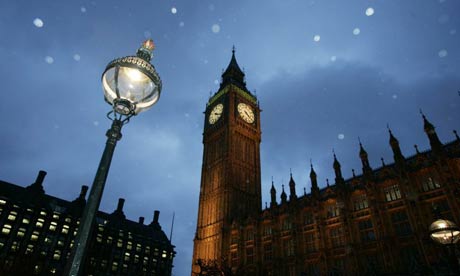Government buildings emit more CO2 than all of Kenya

The Houses of Parliament and the Bank of England together consumed enough
electricity and gas to emit 21,356 tonnes of CO2 a year.
Photograph: Russell Boyce/Reuters
According to the Guardian, public buildings aren't doing that well at reducing their carbon footprint. Buildings in England and Wales cost more than 11m tonnes of CO² yearly. And the Brits actually kind of get Global Warming. Even the Energy and Climate Change Secretary, Ed Miliband, is embarrassed--his department's head office in Whitehall Place one of the worst offenders, costing some 1,336 tonnes of CO² a year.
"Earlier this year, the government's own architecture adviser, the Commission for Architecture and the Built Environment, said the majority of government departments were "failing to make their new buildings and refurbishments sustainable" and that those operating them had little idea how to improve their efficiency," reports the Guardian.
the straightforward and brutal method for reducing carbon emissions is, I'm starting to become more and more convinced, a hard cap for the country (I'm speaking of Canada here, but the idea is translatable). The allowed amount of carbon is set, auctioned off to industry (or, frankly, whomever wants to buy it) and the income generated is returned quarterly directly to the taxpayer. The cap decreases yearly until it sits at less than half of our current emissions by 2015, and if you use your share of the revenue to reduce your own carbon costs (your footprint), you end up ahead of the game. If you don't, the revenue won't begin to cover your increased carbon costs. Everybody plays by the same rules, carbon-expensive projects just won't get built, while greener, or zero-emission projects, will get built. Imports can be dealt with through a series of tariffs that account for manufacturing and shipping carbon costs, the revenue is directed in the same way as the national auction revenue, and with any luck, we can make a real difference. If the US really wants our horribly polluting bitumen-based oil (and the tar sands projects are, if not the number one, certainly in the top five most polluting point sources in the world (see Andrew Nikiforuk's new book Tar Sands: dirty oil and the future of a continent). Will this solution be brutal? Damn right. But we're about 200 years behind where we should be at the moment, and waiting has its costs. The infrastructure we need to build isn't fucking roads, its green energy projects. I'd even be willing to see a transitional use of nuclear power to get us out of this carbon death trap. Gaia has no patience left with us--she's a self-correcting system, and if we keep shitting where we eat, we are gone. There might be twenty or thirty thousand of us left--we are a very tough animal, after all--but the rest of us are worm food. Kiss tomorrow goodbye.
Powered by ScribeFire.



No comments:
Post a Comment